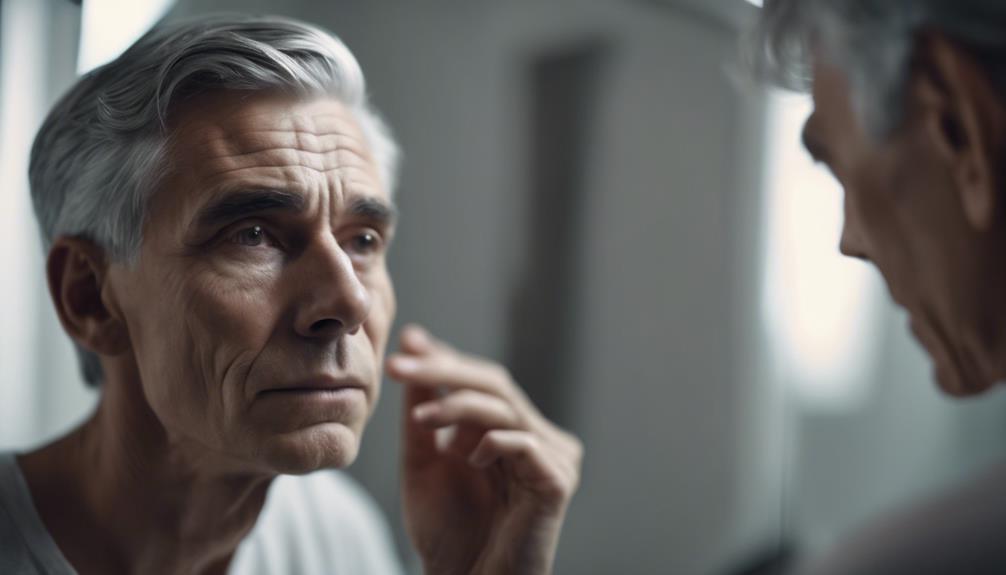Facing the fear of your body’s mortality involves understanding the roots of thanatophobia and exploring practical strategies to navigate this anxiety. Triggers like personal experiences and existential questions can intensify this fear. Every age group faces mortality concerns, with women potentially experiencing spikes in their 20s and 50s. Parents play a significant role in shaping children’s attitudes towards death. Cultivating humility can help reduce fear of death and promote living in the present. Various coping strategies such as mindfulness, therapy, and medication can assist in managing this fear effectively and building resilience. More insights await for those seeking to conquer this fear.
Key Takeaways
- Understanding triggers like existential questions and unresolved matters is crucial.
- Age and gender influence death anxiety levels at different life stages.
- Parental influence on children's fear of death is significant.
- Cultivating humility can help reduce fear of death and promote acceptance.
- Coping strategies include mindfulness, therapy, and medication for managing thanatophobia.
Causes of Thanatophobia
Furthermore, the causes of Thanatophobia, or fear of one's own death, can be attributed to various triggers and influences. Sometimes, the fear of Death stems from specific experiences, like witnessing a loved one's passing or facing a near-death encounter yourself. These events can plant seeds of anxiety that grow into a deep-seated fear over time.
Additionally, cultural beliefs play a significant role in shaping our thoughts about what happens after we die. Whether it's ideas about the afterlife, reincarnation, or judgment in the hereafter, these beliefs can instill a sense of unease about the unknown.
In addition, existential questions about the meaning of life and the mysteries surrounding death can also contribute to this fear. As you learn more about these topics, it's natural to feel a sense of trepidation.
Furthermore, the thought of leaving behind loved ones or unresolved matters can intensify the fear of the dying process. By understanding these triggers, you can take steps to address your anxieties and work towards finding peace in the face of mortality.
Impact of Age on Death Anxiety

As individuals age, their relationship with death anxiety undergoes shifts influenced by various life stages and experiences. In your 20s, mortality concerns may peak, reflecting a phase where the fear of dying process looms large. This period is marked by changes and a growing awareness of aging, leading to heightened anxiety about the end of life.
However, women may face a secondary spike in death anxiety in their 50s, possibly due to unique life shifts. Personality traits also play a role, with higher levels of humility linked to lower levels of death anxiety.
Moreover, as you age, health problems can exacerbate fears of death, emphasizing the impact of physical well-being on mortality concerns. Understanding these dynamics can help you navigate your own anxieties about death as you move through different stages of life.
Gender Differences in Fear of Death

Gender differences influence how individuals perceive and cope with the fear of death. Women, in particular, tend to experience a secondary spike in fear of death in their 50s, in addition to the peak in their 20s. This means that as a woman, you may find yourself grappling with heightened anxiety surrounding mortality during these stages of life.
It's essential to recognize that older individuals may fear the dying process more than the idea of death itself. Additionally, individuals with higher levels of humility are less likely to worry about death, while those facing more physical health problems may experience an increased fear of death.
Understanding these nuances can help you navigate your own feelings towards mortality more effectively. By acknowledging and addressing these gender differences in the fear of death, you can develop healthier coping mechanisms and perceptions that will empower you to face this universal concern with greater resilience and understanding.
Parents' Influence on Death Anxiety

Parents wield significant influence over their children's development of death anxiety through their attitudes and behaviors towards mortality. Children often mirror their parents' responses to death, shaping their understanding and fear of mortality.
It's essential for parents to create open dialogues and healthy coping mechanisms within the family to help alleviate children's anxiety about death. By fostering an environment where discussions about mortality are normalized and supported, parents can positively impact their children's perception of death.
Children may adopt their parents' beliefs and fears about death, highlighting the importance of parents modeling healthy attitudes towards mortality. Providing support and guidance is key in assisting children in dealing with and coping with the concept of death.
Through understanding and empathy, parents can help their children develop resilience and acceptance towards the inevitability of death.
Role of Humility in Overcoming Fear

Cultivating humility can greatly contribute to overcoming the fear of death. Embracing humility is a significant tool in managing death anxiety. Here's how humility can help you in this journey:
- Reduced Fear: Higher levels of humility are linked to reduced fear of death, allowing you to face the concept of mortality with more peace.
- Worry-Free Mind: People with humility are less likely to constantly worry about death, enabling them to live more fully in the present.
- Peaceful Acceptance: By cultivating humility, you can achieve a more peaceful acceptance of the inevitable, making the idea of death less intimidating.
- Managing Anxiety: Humility plays a vital role in managing death anxiety, providing a foundation of inner strength and acceptance.
Managing Health-Related Death Anxiety

When faced with health-related death anxiety, remember that coping with mortality fears is a common struggle. Seeking professional support can provide valuable guidance and tools to navigate these feelings.
Utilizing mindfulness techniques for anxiety can also aid in managing and alleviating the distress caused by these thoughts.
Coping With Mortality Fears
To cope with health-related death anxiety, it's essential to utilize effective coping strategies and seek support from mental health professionals.
Here are some practical steps you can take to manage your mortality fears:
- Lean on your social support network: Surround yourself with friends and family who can provide comfort and understanding during difficult times.
- Explore therapeutic interventions: Consider cognitive-behavioral therapy (CBT) to help reframe negative thoughts and emotions surrounding death anxiety.
- Practice relaxation techniques: Engage in activities like deep breathing, meditation, or yoga to calm your mind and body when feeling overwhelmed.
- Consider medications: Consult with a healthcare provider about the possibility of medications such as beta-blockers or antidepressants to help alleviate symptoms of health-related death anxiety.
Seeking Professional Support
Managing health-related death anxiety can greatly benefit from the support and guidance of mental health professionals. When consulting with mental health professionals, options like Cognitive Behavioral Therapy (CBT) and psychotherapy can be effective in addressing death-related anxiety. These therapies aim to help you understand and manage your fears surrounding the body's mortality.
In some cases, medications such as beta-blockers or antidepressants may be prescribed to assist in managing the physical symptoms of death anxiety. Additionally, incorporating relaxation techniques like meditation and mindfulness into your routine can be beneficial in coping with health-related death anxiety.
Don't underestimate the importance of your social support networks; sharing your feelings and fears with trusted individuals can play a significant role in managing your fear of the body's death. Remember, seeking professional support is a proactive step towards managing health-related death anxiety and improving your overall well-being.
Mindfulness for Anxiety
Incorporating mindfulness techniques into your daily routine can be a beneficial strategy for managing health-related death anxiety. Mindfulness, including practices like deep breathing and meditation, offers powerful tools to help you navigate the fear of your body's mortality.
Here are four ways mindfulness can support you in overcoming anxiety related to the body's death:
- Stress Reduction: Mindfulness practices can reduce stress levels, providing a sense of calm amidst anxiety about the body's mortality.
- Emotional Regulation: By improving emotional regulation, mindfulness helps you cope with the fear and uncertainty surrounding the body's mortality.
- Cortisol Levels: Mindfulness has been shown to lower cortisol levels, the stress hormone, alleviating health-related death anxiety.
- Well-being and Resilience: Regular mindfulness practice enhances overall well-being and resilience, equipping you with effective coping strategies.
Benefits of Talk Therapy

Exploring the benefits of talk therapy in addressing the fear of the body's death reveals its effectiveness in providing a supportive environment for individuals to process their anxieties and develop healthy coping mechanisms.
Talk therapy, also known as psychotherapy, offers a safe space to investigate the fear of death, helping individuals confront their thanatophobia, manage anxiety, and work through traumatic experiences. Through therapy sessions, you can develop coping strategies tailored to your specific fears, gradually moving towards acceptance and improved mental well-being.
Research demonstrates that talk therapy can greatly reduce symptoms of thanatophobia, enhancing overall quality of life. By engaging in therapy and actively participating in discussions with a trained therapist, you can gain valuable insights, learn to navigate your fears, and build resilience in the face of mortality.
Embracing this therapeutic journey can lead to profound growth and a more peaceful relationship with the fear of death.
Cognitive Behavioral Therapy for Thanatophobia

Cognitive Behavioral Therapy offers practical strategies to help individuals confront and alleviate their fear of death, known as Thanatophobia. Through CBT, you can learn to manage anxiety and cope with thoughts of death effectively.
Here's how CBT can help you overcome your fear of death:
- Identifying Negative Thought Patterns: CBT helps you recognize and change harmful beliefs about death that contribute to your anxiety.
- Exposure Exercises: By gradually exposing yourself to death-related triggers, you can desensitize yourself and reduce the intensity of your fear.
- Coping Strategies: CBT equips you with practical techniques to manage anxiety when confronted with thoughts of death.
- Fear Reduction: Research shows that CBT is effective in reducing fear and anxiety associated with Thanatophobia, offering hope for a brighter, less fearful future.
Relaxation Techniques for Death Anxiety

To address death anxiety, incorporating relaxation techniques such as deep breathing and meditation can be beneficial in calming your mind and reducing stress levels. Deep breathing involves taking slow, deep breaths to relax your body and mind, while meditation focuses on being present in the moment and letting go of anxious thoughts. These practices can help in managing anxiety about death by promoting mindfulness and reducing the fear associated with it. By engaging in these relaxation techniques regularly, you can enhance your mental well-being and develop resilience in coping with the fear of death. Remember, utilizing these methods is a proactive approach to soothing your mind and body, offering a sense of peace and tranquility. Below is a table summarizing the benefits of relaxation techniques for death anxiety:
| Relaxation Techniques | Benefits |
|---|---|
| Deep Breathing | Calms the mind, reduces stress |
| Meditation | Promotes mindfulness, peace |
Medication Options for Fear of Death

When facing the fear of death, exploring medication options like beta-blockers or antidepressants can help manage anxiety symptoms effectively.
Beta-blockers work to reduce physical manifestations such as rapid heartbeat, while antidepressants target underlying anxiety and panic associated with the fear of death.
Remember that combining medication with therapy offers a thorough approach to addressing and overcoming the fear of death, so consulting a healthcare professional is essential in determining the most suitable treatment plan for you.
Medication for Anxiety
If you're experiencing anxiety related to the fear of death, exploring medication options like beta-blockers or antidepressants could be beneficial in managing your symptoms.
Here are a few key points to keep in mind:
- Relief from Physical Symptoms: Medications such as beta-blockers and antidepressants can help alleviate physical symptoms like rapid heartbeat or sweating that often accompany anxiety about death.
- Mechanism of Action: Beta-blockers work by blocking the effects of adrenaline, which can reduce the physical manifestations of anxiety, providing a sense of calm.
- Regulating Mood: Antidepressants play an important role in regulating mood and can effectively alleviate anxiety symptoms associated with thanatophobia, the fear of death.
- Consult with a Professional: It's important to consult with a healthcare provider to determine the most suitable medication for managing anxiety related to the fear of death. Your healthcare provider can guide you through the process and make sure you receive the appropriate treatment for your specific needs.
Therapy for Phobias
Consider incorporating relaxation techniques and seeking support from trusted individuals to help manage your fear of death phobia. In addition to exploring medication options like D-cycloserine for targeted treatment.
Cognitive Behavioral Therapy (CBT) is a valuable tool in addressing specific phobias, including the fear of death, by helping you reframe negative thought patterns. Exposure therapy can aid in desensitizing you to the fear of death, gradually reducing its impact on your life.
Relaxation techniques such as deep breathing and meditation are effective in calming your mind when fear arises. Joining support groups can provide a sense of community and understanding, enhancing your ability to cope with the fear of death.
Frequently Asked Questions
How Do I Overcome My Fear of Death?
To overcome your fear of death, acknowledge its commonality, seek help from professionals, practice mindfulness, discuss openly, and explore spiritual beliefs. By taking these steps, you can gradually cultivate acceptance and peace with mortality.
How to Get Over the Fear of Dead Bodies?
To get over the fear of dead bodies, breathe through it. Seek support from loved ones or therapy. Face your fear head-on with exposure therapy. Remember, you're stronger than this fear. You've got this!
Why Am I so Scared of Dying?
You're scared of dying because it's natural to fear the unknown and losing control. Trauma, existential thoughts, and cultural beliefs can intensify this fear. Seeking therapy, medication, and understanding mortality can help manage and overcome this fear.
How to Stop Worrying About Someone Dying?
To stop worrying about someone dying, focus on living in the present moment with them. Share your fears openly, seek professional guidance if needed, and cherish the time you have together. Remember, love transcends even the fear of death.
Conclusion
In the end, facing your fear of death head-on may seem challenging, but remember, you have the power to overcome it.
By seeking help, practicing relaxation techniques, and staying open to growth, you can gradually lessen the grip of Thanatophobia on your life.
As the saying goes, 'Don't fear the unknown, embrace the journey ahead with courage and resilience.'
You have the strength within you to conquer this fear and live a more fulfilling life. Stay strong and keep moving forward.









